It's duckling season! Hooray! Here's a picture of a duckling armada out at my local marsh.

Cats, charts, and politics

It's duckling season! Hooray! Here's a picture of a duckling armada out at my local marsh.

Jay Rosen on the resistance to getting vaccinated among Republicans:
We're still underplaying what a bizarre result this is. https://t.co/AFM5LQx85F
— Jay Rosen (@jayrosen_nyu) June 14, 2021
"Bizarre." Is this also bizarre?
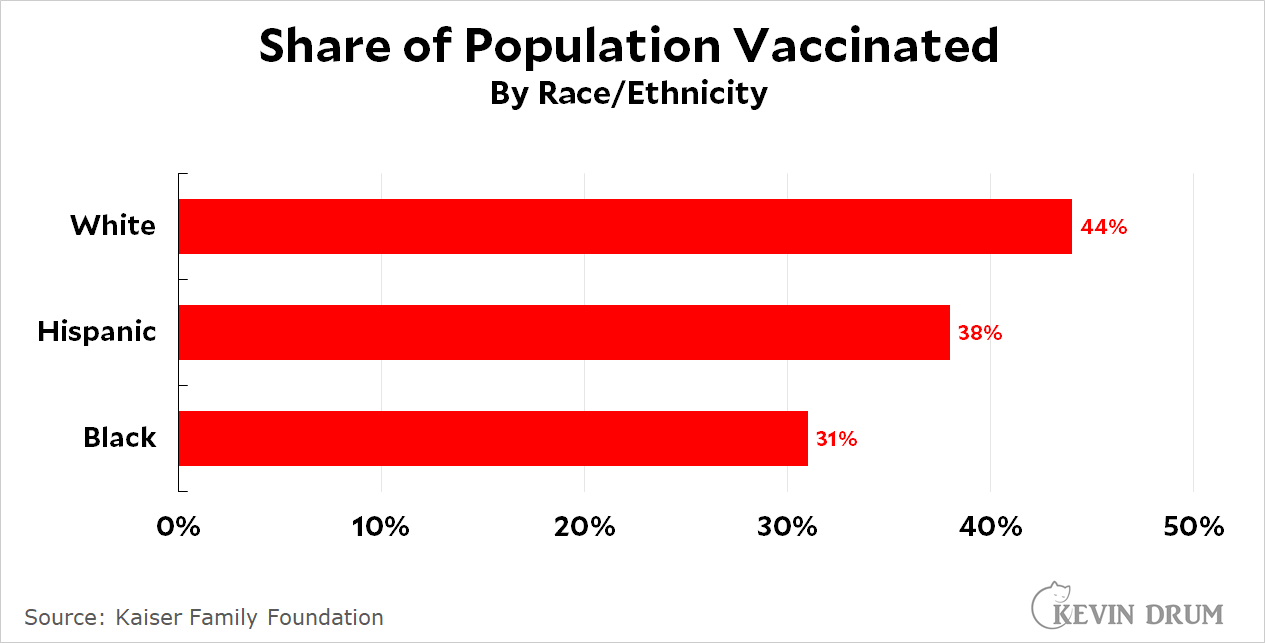
In the case of the Black community, we insist on being understanding about their low vaccination rates. They don't trust the medical community and they've got good reason. So, while we have to work with them to get their vaccination rates up, we also need to display a proper empathy for their fears and history.
But when it comes to conservatives, no such empathy is required despite the fact that conservatives are historically averse to vaccinations too. So even though their vaccination rate is close to that of independents, it's dismissed as "bizarre." They're all just a bunch of idiot Trumpies anyway, amirite?
This is pissing me off. Either show some damn empathy for everyone or stop pretending.¹
¹I plan to make this sentence my personal motto going forward.
The most dangerous part of all the new Republican voting laws isn't the hodgepodge of rules about closing times and ballot boxes and so forth. It's the rules that allow Republican legislatures to replace election officials if they're unhappy about how the count is going. But the AP reports that these rules might not even be necessary:
After facing threats and intimidation during the 2020 presidential election and its aftermath, and now the potential of new punishments in certain states, county officials who run elections are quitting or retiring early. The once quiet job of elections administration has become a political minefield thanks to the baseless claims of widespread fraud that continue to be pushed by many in the Republican Party.
....About a third of Pennsylvania’s county election officials have left in the last year and a half....The executive director of a clerks association in Wisconsin said more than two dozen clerks had retired since the presidential election and another 30 clerks or their deputies quit by the end of 2020.
....The exodus comes as Republicans in a number of states pursue legislation that imposes new fines or criminal penalties on local elections officials or makes it easier to remove them, as part of the GOP campaign to rewrite rules for voting and administering elections. A new law in Iowa imposes a $10,000 fine on elections administrators for a technical infraction of election rules. A similar law in Florida could lead to $25,000 fines for elections supervisors if a ballot drop box is accessible outside early voting hours or is left unsupervised.
The new Republican rules are apparently just a backup. The real plan is simply to terrorize local election officials into quitting so they can be replaced with true believers who can make sure that next time Donald Trump has all the votes he needs to win. Welcome to the latest installment of Banana Republicanism, my friends.
Here’s the officially reported coronavirus death toll through June 13. The raw data from Johns Hopkins is here.
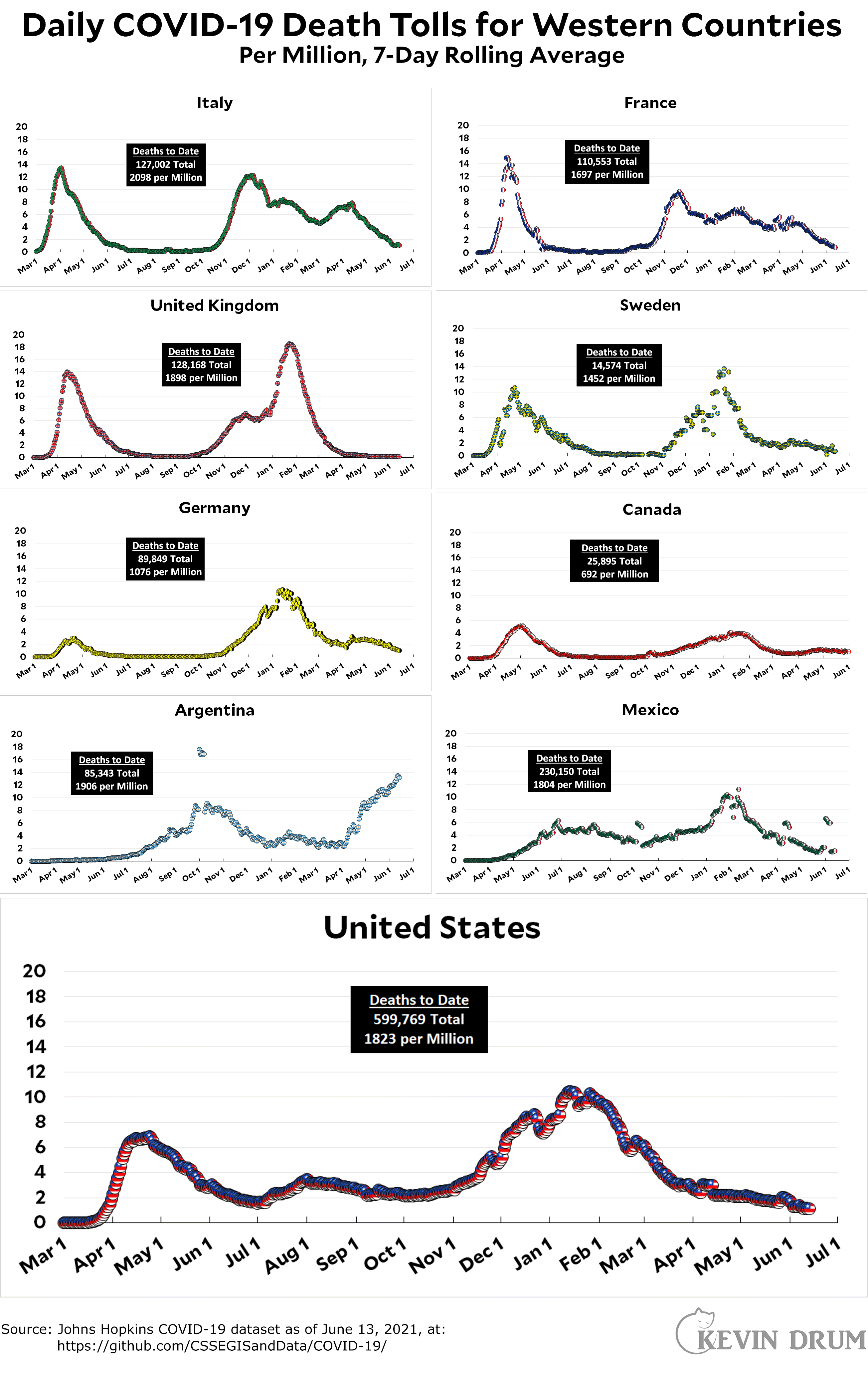
I don't bother too much commenting about the "race" issues currently dominating our discourse since I don't think the conservative position is offered in anything close to good faith. Maybe that's a mistake, but I'm tired of fighting against fake outrage. Why bother when you know that whatever arguments you bring to bear are pointless?
But let's take a short break from this weariness and at least ask a few questions about two of our current controversies. I apologize in advance for simply saying what I mean instead of adopting the currently fashionable vocabulary that values nuance above all and drains meaning from everything it touches.
First, put aside all the nonsense about "critical race theory," which is just a phrase conservatives have picked up without knowing what it means. (If you want to know, Wikipedia is a click away.) What is it they're really upset about?
The answer, I think, is not discussions of slavery or racism per se, but discussions that implicitly or explicitly blame white people as a class for it. Now, you might wonder who else could be to blame for it, but put that snark aside. The fact remains that conservatives don't want to be made to feel endlessly guilty about racism, and they don't want schools to make their kids feel that way.
Question: given this reality, should the rest of us stop trying to make everyone feel guilty about past and present racism? Is guilt an effective motivator for change in the first place?
Second, the modern progressive argument about race mostly revolves around systemic racism, the idea that racism is less about individual bigotry than it is about racism embedded in our institutions. A good example of this is the redlining of neighborhoods in the middle part of the 20th century, which prevented Black homebuyers from getting loans to buy houses in good neighborhoods. This is the kind of thing we should focus on, not on raking individual people who display racist behavior.¹
If this is the case, it would be handy to have good examples that exist today. I have ideas of my own about which ones are most important, but who cares what I think? It would be better to develop some kind of quasi-consensus about this. So: what are the three most important current examples of systemic racism that would help non-progressives to see what we're talking about? Leave your nominations in comments.
¹Although God knows we do plenty of this too.
How about that French Open, huh? What a terrible tournament it was this year.
The women's final pitted an unseeded Barbora Krejcikova against a 31st seeded doubles specialist, and the play was about what you'd expect. It was atrocious. Not a single woman ranked in the top 20 even made it to the semifinals.
On the men's side, Stefanos Tsitsipas won his first two sets against Novak Djokovic in the final and then lost the third. Then he took a timeout and asked the trainer to "work on his back." This was practically an admission of defeat: he was basically giving himself permission to lose. And sure enough, he did.
This is the difference between the Big Three and everyone else: Federer, Nadal, and Djokovic play every single point the same. They keep coming at you no matter what. Other players lose a set to one of these guys and they all but give up.
Anyway, Djokovic now has 19 grand slams under his belt, yet another testament to the conditioning revolution that took over tennis a couple of decades ago. Until about the year 2000, age 30 was it. Nobody won slams after that. Now, players keep on going for another decade. Take a look at the records of the men who have won the most grand slam titles over the past half century:
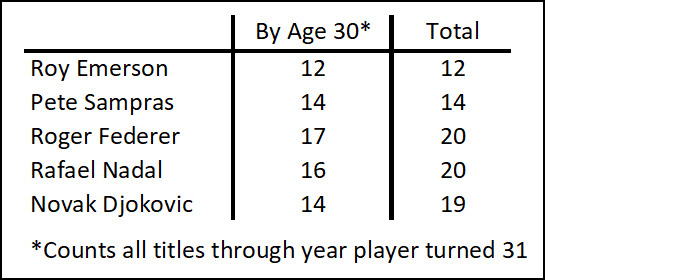
Emerson and Sampras won all their titles by age 30. Federer and Nadal both beat Sampras's record by age 30, but only barely. The difference is that they just kept on winning, which is why they haven't just beaten Sampras's record, but scorched it.
That said, it's a sad commentary on the men's game that nobody in their twenties can give these guys a run. It's insane. They can't be that good. Where's the talent?
To finish off our survey of the Big Six welfare programs in the United States, here's a summary of spending growth for all of them since 1980:
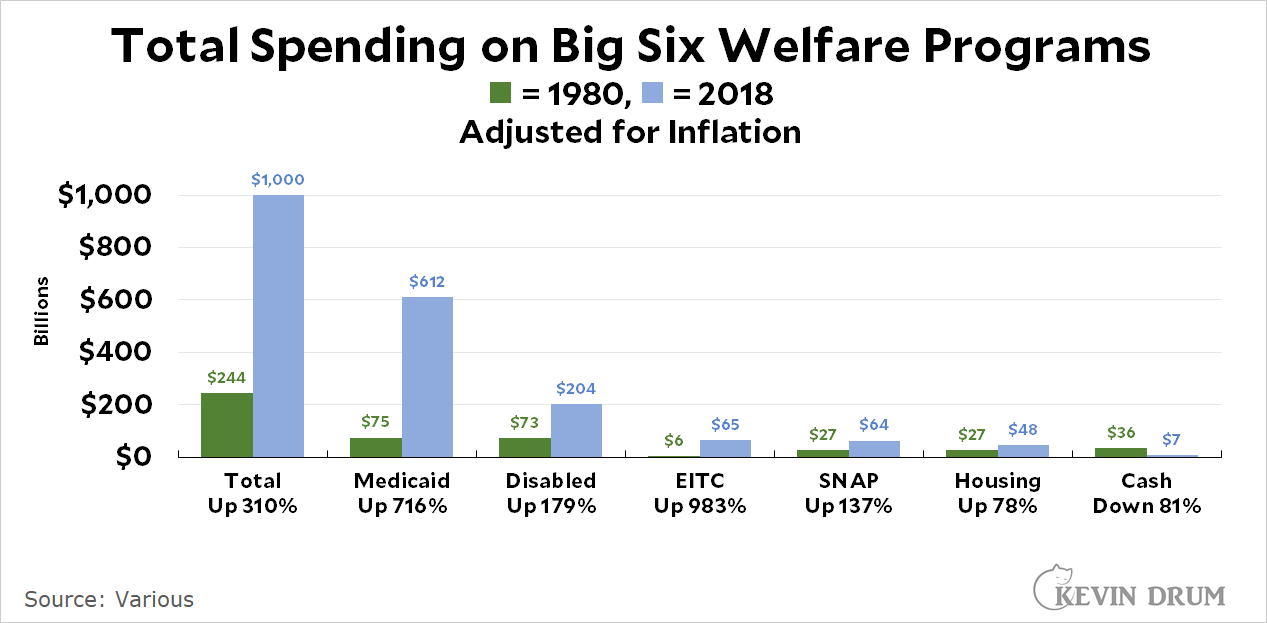
Medicaid is the biggest program by far at about $600 billion in 2018, with the others contributing about $400 billion. Total spending on all six programs has gone up from $244 billion in 1980 to $1 trillion in 2018, adjusted for inflation. That's a 4x increase.
However, as a percentage of GDP, total welfare spending has gone up from 2.8% to 4.9%, which is less than a 2x increase.
Both of these numbers are correct. Which one you choose to emphasize is mostly a matter of what point you're trying to make.
Here’s the officially reported coronavirus death toll through June 12. The raw data from Johns Hopkins is here.
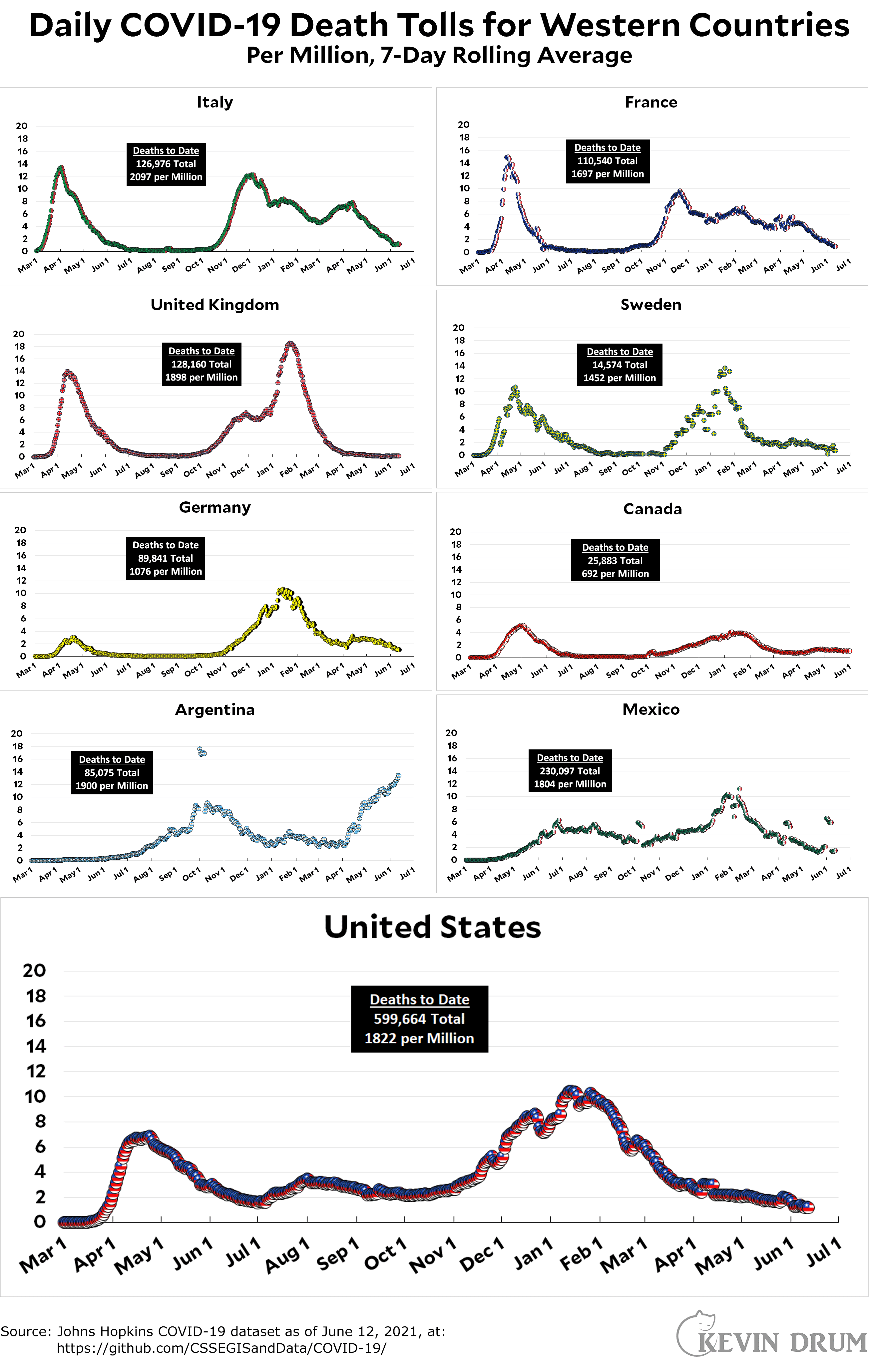
Just a quick reminder: There is no more evidence today in favor of the lab-leak theory than there ever has been. Which is to say, none. This isn't me taking sides one way or the other, it's just a fact. There's still zero direct evidence for the lab-leak theory and exactly the same amount of circumstantial evidence as always (first outbreak was in Wuhan, Chinese leaders have been extremely defensive, zoonotic origin still not proven, etc.).
The lab-leak theory is the journalistic shiny object of the day, but that's all. The actual evidence one way or the other hasn't changed a bit.
UPDATE: Cheryl Rofer notes here the yearlong effort to shop the lab-leak theory by Mike Pompeo and the Murdoch media empire. Apparently they've finally been successful.
The first federal program to give cash to poor people was called Aid to Families with Dependent Children (AFDC), passed in 1935 as part of the New Deal. It was aimed at widows with children, a group that, at the time, everyone agreed should be supported with cash specifically so they didn't have to work and could instead devote time to raising their families.
In the '60s AFDC was steadily expanded to include anyone with children, which made the program increasingly unpopular. Widows during the Great Depression were one thing, but single mothers without jobs during good economic times were quite another—especially because so many of them were now urban and Black. In the '90s, the AFDC rolls started to increase, reaching a high point of 14 million recipients, and public support for cash payments designed to allow women not to work floundered. As a result of all this, Bill Clinton promised during the 1992 presidential campaign to "end welfare as we know it."
In 1995 AFDC was abolished and replaced with Temporary Assistance for Needy Families (TANF). Its emphasis was on work, and it put limits on how long unemployed mothers could receive assistance. As a result, the TANF rolls fell dramatically:
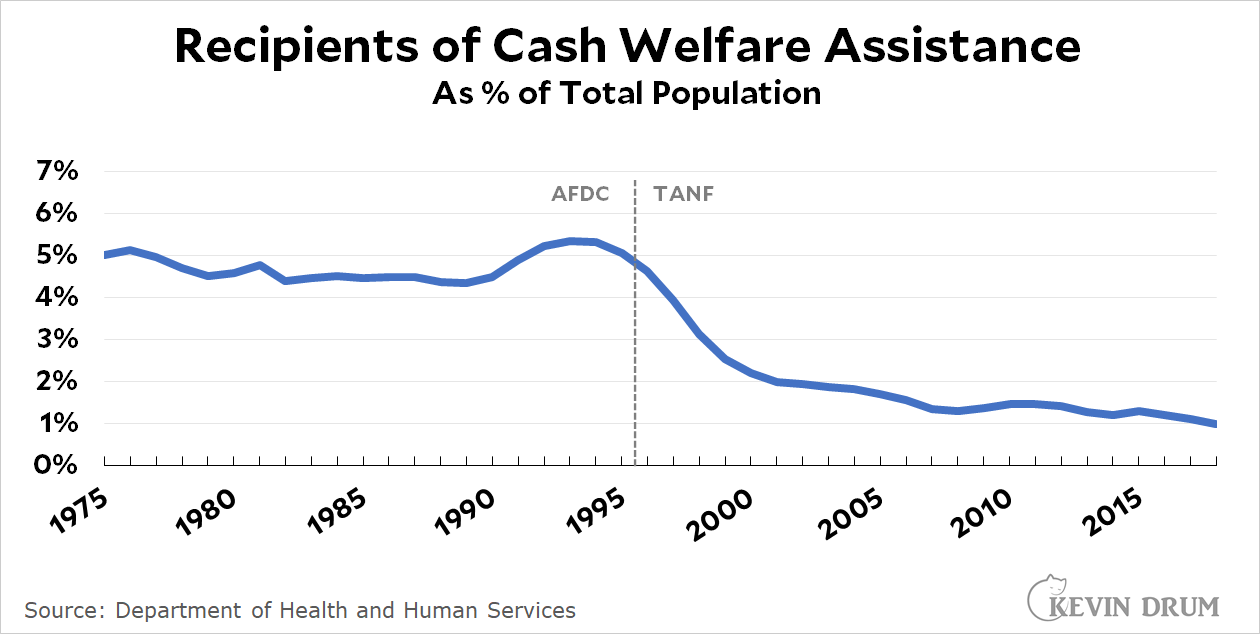
The average benefit from AFDC slowly dropped in the '70s and '80s, and that decline continued after the switch to TANF:
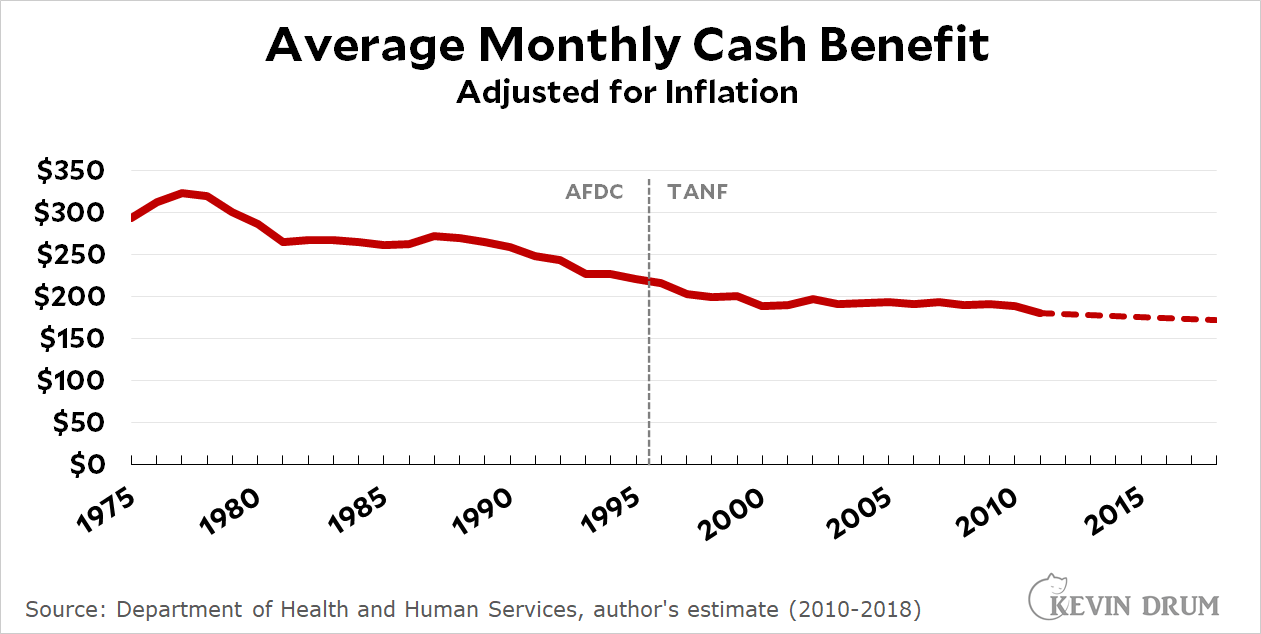
Today, the TANF rolls have dropped to about 3 million people and monthly checks average about $170. For practical purposes, cash welfare has been all but eliminated.
Data comes from the Department of Health and Human Services. Total recipients are here (Appendix A, TANF Table 1) and here (Table 7 Indicator 3). Average benefits are here through 2011 and extrapolated from CBPP estimate of average 2010-2020 decrease here (Appendix Table 3) for 2012-2018.